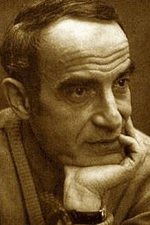> [Archived] Chronicles

One year without maestro Dan Mizrahi
‘I have worked hard to learn
music; to understand music and its principles, and to actually teach it, with
love, with commitment, with hard work, and, of course, with passion. I have to
admit that through my accomplishments as an artist, as a teacher and as a
composer I have helped other people, who have been inspired by my performances,
my pedagogical advice or my works, to gain success in music. But for me their
success has been ten times more important and has increased the fulfilment that
Music has so generously provided me with.’
These
were the conclusions of the much-missed pianist Dan
Mizrahi, put between the pages of what could be called ‘a biographical novel’
– the book Așa a fost (This is how it
happened), published
by the Hasefer Publishing House together with Liliana Pavelescu in 2005. The
book was the subject of a warm and friendly meeting that took place at the
headquarters of the Federation of the Jewish Communities in
‘The year that went by marked
not an absence but a presence’...
… because
‘we all keep the memory of Dan Mizrahi alive, but each of us in a different
way’, PhD. Professor Grigore Constantinescu, one of the speakers, said in his
speech. Indeed, we remember maestro Mizrahi as an unmatched performer of works
written by Gershwin, Bach, Mozart or Beethoven, other people remember him as a companion
in the communist prisons or as a mentor, as a dear friend or as a composer for
whom the melody was the core of the creation, as a winner of the ‘Crizantema de aur’ Competition (The
Golden Chrysanthemum Competition) or simply as the talented author of
several essays, articles and courses.
The
much-missed Dan Mizrahi was described as such by Aurel Vainer, President of the
Federation of
the Jewish Communities and Parliament deputy, by Ștefan Iureș, director
of the Hasefer Publishing House, by Iancu Țucărman, Holocaust survivor, by PhD.
Professor Grigore Constantinescu, by actor Adrian Păduraru. The excerpts from
the book Așa a fost were read by Ilinca Goia, an actress of the National
Theatre. Usually, the speeches at such events are too lengthy, and, therefore,
everybody appreciated that all speakers expressed only main ideas, without
boring the audience and managing to put together through their speeches the
complex picture not only of Dan Mizrahi, the musician, but also of Dan Mizrahi,
the man.
No
music = no life
It goes
without saying that such a meeting held in the memory of the man for whom
‘being deprived of music’ meant, as he used to say, ‘being deprived of the
liberty to live’ would not have made much sense without listening to the
maestro’s works and recordings. Soprano Mariana Colpoș and tenor Florin
Diaconescu were joined by several members of the ‘George Enescu’ Philharmonic
Choir to perform lieds and ballads, accompanied by pianist Despina Carabella
Oproiu.
The
interview Gabriela Popescu conducted with maestro Mizrahi for TVR Cultural was
broadcast together with the recording of Rhapsody
in Blue by George Gershwin, one of the artistic trademarks of the pianist who,
for the first time, performed the works of the American composer in
The
event was neatly organised by the distinguished wife of the musician, Cecilia
Mizrahi, by the Jewish Communities in Bucharest and by the Federation of the Jewish
Communities of Romania, and the warm, friendly and relaxed
atmosphere would have probably pleased the maestro who once reached the
conclusion, which we all share, that ‘life is a long line of painful departures’.
Translated by Raluca Mizdrea and Elena Daniela Radu
MTTLC, Bucharest University














